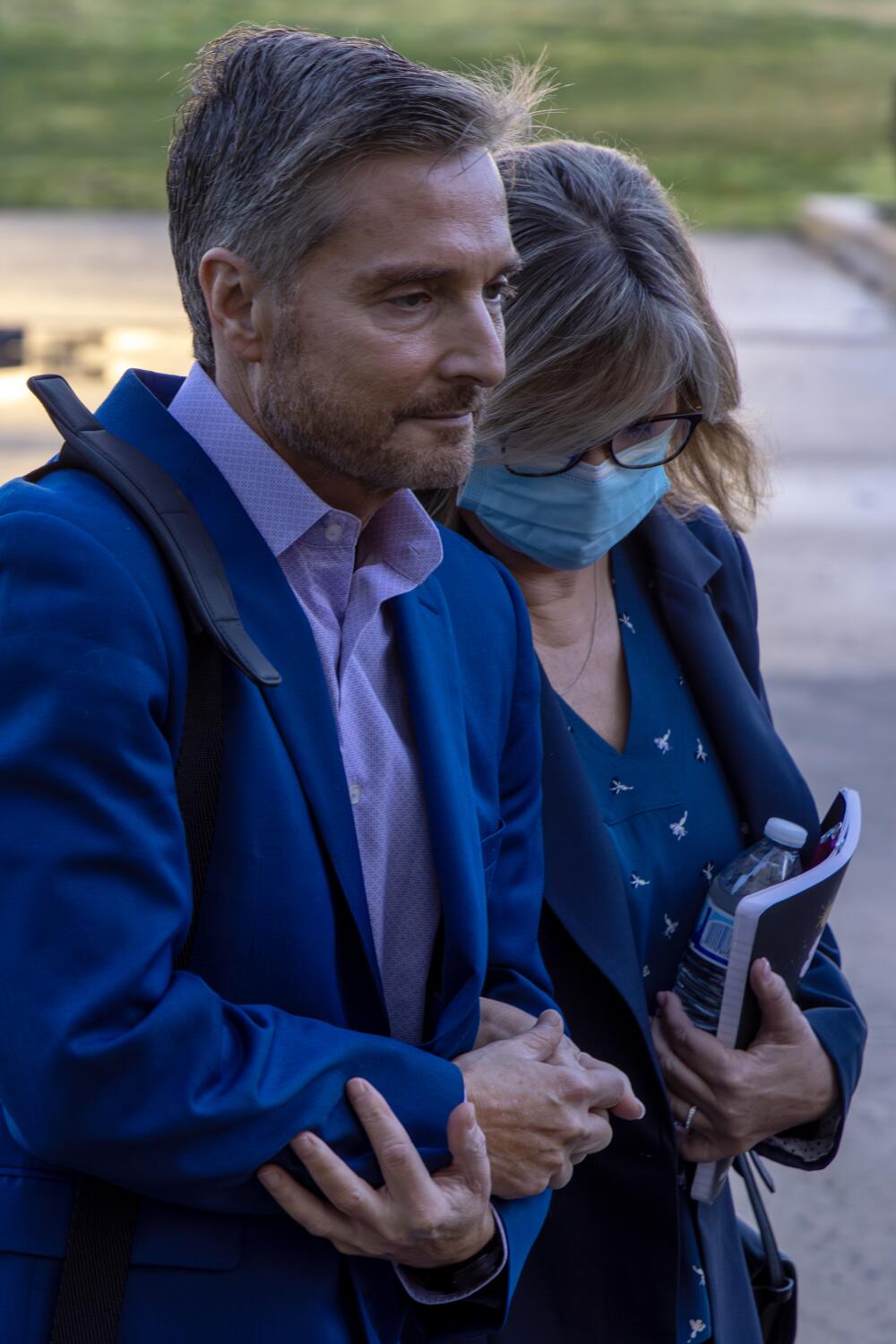
A Hidden Hills driver charged with the hit-and-run murder of two children said in an emergency room after her arrest that she would be home in her garage if the car security system had not disabled her Mercedes, she testified. a hospital technician on Thursday.
The surprising testimony came during Rebecca Grossman’s murder trial for the deaths of brothers Mark and Jacob Iskander, ages 11 and 8, who were struck while crossing Triunfo Canyon Road at Saddle Mountain Drive in Westlake Village with their mother on the 29th. September 2020.
Grossman, 60, is charged with two counts of murder, vehicular manslaughter and hit-and-run. Thursday’s testimony appeared to be an effort by prosecutors to support her claim that she was trying to flee in her badly damaged Mercedes when the van’s security system rendered the vehicle inoperable, about a third of a mile beyond the pedestrian crossing.
Emergency medical technician Teryl Grasso testified that she was working in the emergency room at Los Robles Regional Medical Center when Grossman was admitted after the accident.
“If they hadn’t disabled my car, I would be in my house right now, in my garage,” Grossman said, according to Grasso when questioned by the district deputy. Lawyer. Jaime Castro.
Tony Buzbee, Grossman’s lead attorney, immediately questioned why Grasso said he was “stalking the news,” apparently implying that he might be biased and read all the stories about the incident. Buzbee also questioned why it took Grasso three years to bring the charge.
The harassment phrase immediately drew objections from prosecutors, but Buzbee said it was Grasso’s phrase.
“I was stalking the news and I had to go to therapy too,” Grasso responded. “I was traumatized.”
Grasso said she was prompted to come forward because of Grossman’s multiple comments that night and his behavior at the time. “I’m not saying she didn’t care about those kids,” Grasso added.
Castro then asked if she delayed coming forward because she was unsure whether speaking out would violate federal law protecting patient privacy.
Grasso said that was correct and that he eventually sought advice on the Health Insurance Portability and Accountability Act and discovered that he could report comments under these circumstances.
Grasso testified that he received therapy for nine months in connection with the incident. “I still can’t talk about that night without crying,” he said.
Early in the trial, Buzbee got a Los Angeles County sheriff’s deputy to acknowledge that when Grossman was found standing in front of her damaged vehicle, she was about three-tenths of a mile from her home at the time in Westlake Village.
On Wednesday, Deputy Rafael Mejia testified that he found Grossman standing in front of her Mercedes a short distance from the crash site. The truck had visible damage to the front, including a bent fender on the passenger side, which sheriff’s officials photographed.
“She told me that her vehicle was disabled by Mercedes-Benz and that her airbags went off, and that she didn’t know what was happening,” Mejia said. “She said she hit something, but she didn’t know what she hit.”
Mejia said he noticed what appeared to be blood splatters on Grossman’s vehicle, but acknowledged that he had not analyzed them. He said the only pieces found at the scene were from Grossman’s vehicle.
Prosecutors have presented witnesses who show that Grossman and her then-boyfriend, Scott Erickson, 55, a former Dodger pitcher, sped through the intersection that night after having drinks at a nearby restaurant.
Prosecutors on Thursday asked Royce Clayton, a former baseball player who had been drinking with Grossman and Erickson that night, to return to the witness stand to clarify his earlier testimony.
Clayton testified earlier this week explaining why he is no longer friends with Erickson. “I just don’t understand how he can be so negligent and responsible for running over children.”
The judge, however, refused to allow Clayton to return to the stand Thursday.
Much of Thursday was spent by Grossman’s legal team showing numerous deficiencies in the way Deputy Michael Kelley performed a field sobriety test on Grossman when he arrested her. Kelley repeatedly admitted that he did not follow very exact national standards for determining whether Grossman was disabled, including requiring her to walk in a line and not timing her while she stood on one leg.
Although she is not charged with driving under the influence, prosecutors say Grossman was intoxicated. An on-site breathalyzer test showed a blood alcohol content of 0.076%, slightly below California’s legal limit of 0.08%. A blood sample taken three hours after the accident registered a mark of 0.08%. Additionally, Valium was found in her blood, according to prosecutors.

